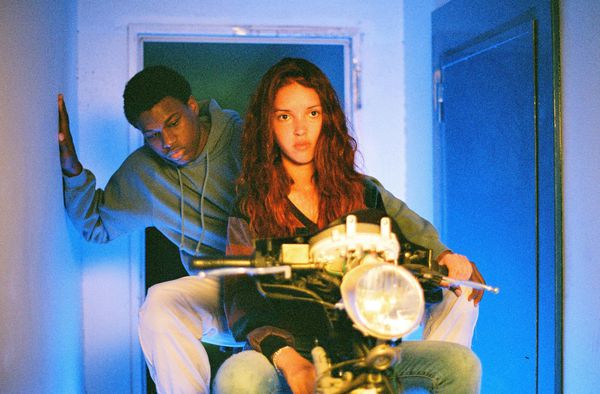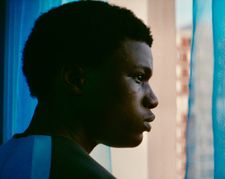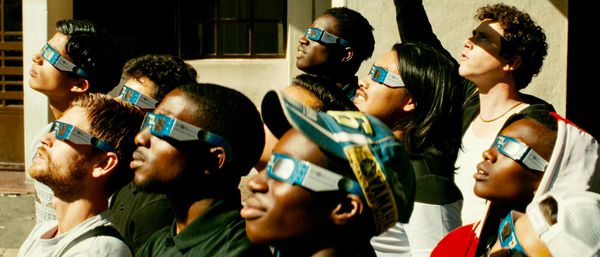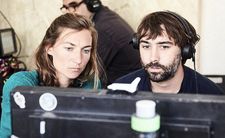Filmmakers Fanny Liotard and Jérémie Trouilh stumbled on archive black and white footage during researches for their feature film Gagarine and knew immediately that it would provide the perfect opening segment.
Liotard and Trouilh had already immersed themselves in the subject with the short film Gagarine in 2014 when they won a screenwriting contest. The short was shown and noticed at various festivals. “It was only 15 minutes long, but it gave us the opportunity to meet the inhabitants of the Gagarine and to forge links. When we were done with the short we started right away to expand the subject and write the feature. We were fortunate enough to have been contacted by the production company Haut et Court asking if we had a feature project on the go … and we told them about this one. They liked it and it then took us around three years to finalise the script,” said Liotard.
Their idea was to focus particularly on Youri, 16, who had lived all his life in the sprawling Gagarine Cité. From the heights of his apartment, he dreams of becoming an astronaut. But when plans to demolish his community’s home are leaked, Youri joins the resistance. With his friends Diana and Houssam, he embarks on a mission to save Gagarine, transforming the estate into his own “starship” – before it disappeared forever.
Trouilh added: “One of the main challenges that propelled us to make this film, was finding the balance between a social reality that touched us deeply, about a place that is going to disappear, and on the other hand a young man who is being abandoned by society like so many others of his kind. But when you meet them it is not only all about drugs and crime … most of them have huge dreams too. We wanted to go a step aside and tell a story that also had some magical realism. When we found this strong character who looks at this building like a spaceship it gave us the opportunity to have freedom in the way we developed the feature. We found inspiration in such films as 2001 A Space Odyssey, Bladerunner and Solaris. We also felt kinship to such directors as Leos Carax and Bong Joon-ho - directors who mix genres and who have a point of view on our society.”
 |
| Newcomer Alséni Bathily and Lynda Khoudri in Gagarine Photo: Unifrance |
The filmmakers were keen to have some real science fiction scenes in the film. “The weightlessness parts were quite a challenge for us. We shot just before the building was demolished so it was completely empty. It became a huge studio for us. We shot this scene of Youri flying on the stairs - but it was quite frightening because here was our main character suspended 15 minutes off the ground with only one cable. Outside were huge lighting rigs to recreate the sun on the building. When I called action it already seemed to be science fiction because you could not see the cable but only this young man - Alséni Bathily who had never acted before and who was so excited to be flying. It was the realisation of a crazy dream,” explained Trouilh.
Liotard and Trouilh managed to gain the confidence of the people lived there before they were disgorged to other social housing around Paris prior to demolition. Liotard recalled the first time they arrived at Gagarine. “We were surrounded by young people hanging around at the bottom of the building. They were very curious … we knew we had to gain their trust. They did not want us to portray them in a downbeat way but in an optimistic manner. With the building set to be demolished it is like the end of a love story and that was enough to build a moment of solidarity just before the end.
“We met a lot of the local associations and groups who helped us a lot. During the writing process we spent considerable time there because it gave us added energy to write just by being in those surroundings. We also carried out a lot of workshops with young people when we were there. All that time spent on site helped to inform the writing process and indeed marked our own lives.”
The production provided valuable lessons on how to communicate on such a vast project. “It took five years of our lives with more and more people coming involved. You have to be able to talk through your ideas and also to listen when it is appropriate. At the end of the day it is not just our movie but the movie of all those involved in it. We had to be able to communicate and provide the right atmosphere for people to work together,” said Trouilh.
Finding a new face to play Youri was an intricate process. “We did six months of casting with someone who specialises in people who are not professional actors. We met Alséni Bathily at his high school and then afterwards he sent an email saying he wanted to take part which already was a big step. He was a very special person and it turned out he was an amazing actor although he had had no previous experience.
 |
| Alséni Bathily: 'Quiet and very sensitive but also very aware. He brought that complexity to the part' Photo: Haut et Court |
For the moment their only regret is not having been able to show the film to all the former residents. They will organise a show once the pandemic restrictions are lifted. They did bring them all back on site just before the demolition for the final scene. “It was quite emotional but also quite funny because it was in August and it was quite hot. In the story it was winter time so they had to wear big jackets and warm clothes. They were not professional actors, of course, so they were not used to having to wait for hours for the scene to take place’” recalled Trouilh.
The two film-makers had studied together at the School of Political Science in Bordeaux. They switched to filmmaking later through traveling and meeting people. Trouilh had travelled to India, then South America, from where he decided to apply to a master’s program in creative documentary-making at Lussas in the Ardèche region. Meanwhile, Liotard had goneto Lebanon, then worked in Marseille on arts projects linked to urban renewal. She pitched a short film idea to La Ruche de Gindou Cinéma, a screenwriting course for the self-taught.
Eighteen months after these respective experiences, they met up in Paris with the shared desire to write and direct fiction films. Their four short films, all rooted in a poetic urban and social reality, have won awards at many international festivals including Palm Springs, Clermont Ferrand, and Sundance. Feature debut Gagarine was part of last year’s Cannes Film Festival official selection. It was nominated for the European Discovery 2020 Award bestowed by the international film critics association Fipresci and shortlisted to be France’s candidate for the best international feature film in the 2021 Oscars. It will be released in the US by the Cohen Media Group and in the UK and Ireland by Curzon.
Gagarine receives its UK premiere as part of the Glasgow Film Festival and available online here from 4 March to 7 March. You can pre-order a viewing now.























